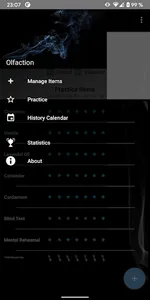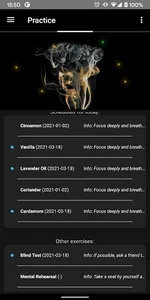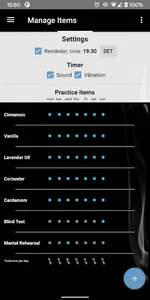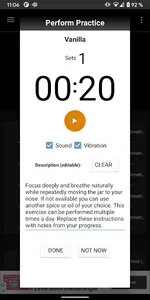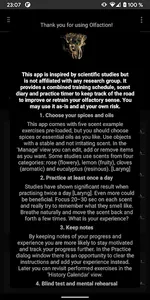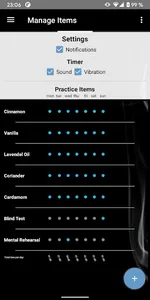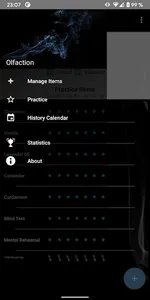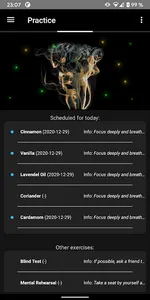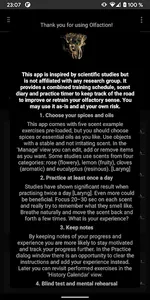Studies have shown that it is possible to train your sense of smell if it is lost through an injury or infection. The earlier you start training the better, and preferably you should train at least a couple of times every day.
This app contains exercises, reminders and time keeping to help retrain your sense of smell. By saving the performed exercises and notes from them, you can follow your path towards regaining the ability and relieving anosmia.
The olfactory sense is very important for your overall taste experience and plays a greater role in everyday life than many people think. If you exercise a little every day, you should soon notice that you feel more and clearer smells around you.
In-app Features:
* Timer for anosmia exercises
* Exercise diary with calendar
* Suggestions for concrete exercises and smell examples
* Statistics
* Virtual rewards for staying motivated
This app is inspired by scientific studies but is not affiliated with any research group. It provides a combined training schedule, scent diary and practice timer to keep track of the road to improve or retrain your olfactory sense. You may use it as-is without any warranty.
1. Choose your spices and oils
This app comes with five scent example exercises pre-loaded, but you should choose spices or essential oils as you like. Use objects with a stable and not irritating scent. In the 'Manage' view you can edit, add or remove items as you want. Some studies use scents from four categories: rose (flowery), lemon (fruity), cloves (aromatic) and eucalyptus (resinous).
2. Practice at least once a day
Studies have shown significant result when practicing twice a day. Even more could be beneficial. Focus 20–30 sec on each scent and really try to remember what they smell like. Breathe naturally and move the scent back and forth a few times. What is your experience?
3. Keep notes
By keeping notes of your progress and experience you are more likely to stay motivated and track your progress further. In the 'Practice' dialog window there is an opportunity to clear the instructions and add your experience instead. Later you can revisit performed exercises in the 'History Calendar' view.
4. Blind test and mental rehearsal
This app has two additional weekly exercises. The blind test can be a fun way to check your progress. And the other is a mental rehearsal, meaning you are sitting back relaxed and imagining aromas for a few minutes - this has, perhaps surprisingly, been showed to improve results.
5. Stick with it
Research has found you'll need to commit to olfactory practice for up to 6 months to really see results. Also make sure you get to the habit of noting the smell of things in your daily life. By consistently engaging your olfaction, your brain can start rewiring itself - and hopefully recover partly or completely from anosmia, hyposmia or parosmia.
Sources and continued Reading
There are many studies on odor training, here are some examples:
* Effects of olfactory training in patients with olfactory loss. Laryngoscope. 2009;119(3):496.
* Specific anosmia and the concept of primary odors. Chemical Senses and Flavors. 1977; 2: 267–281.
* Recovery of olfactory function induces neuroplasticity effects in patients with smell loss. Neural Plasticity. 2014;2014:140419.
This app contains exercises, reminders and time keeping to help retrain your sense of smell. By saving the performed exercises and notes from them, you can follow your path towards regaining the ability and relieving anosmia.
The olfactory sense is very important for your overall taste experience and plays a greater role in everyday life than many people think. If you exercise a little every day, you should soon notice that you feel more and clearer smells around you.
In-app Features:
* Timer for anosmia exercises
* Exercise diary with calendar
* Suggestions for concrete exercises and smell examples
* Statistics
* Virtual rewards for staying motivated
This app is inspired by scientific studies but is not affiliated with any research group. It provides a combined training schedule, scent diary and practice timer to keep track of the road to improve or retrain your olfactory sense. You may use it as-is without any warranty.
1. Choose your spices and oils
This app comes with five scent example exercises pre-loaded, but you should choose spices or essential oils as you like. Use objects with a stable and not irritating scent. In the 'Manage' view you can edit, add or remove items as you want. Some studies use scents from four categories: rose (flowery), lemon (fruity), cloves (aromatic) and eucalyptus (resinous).
2. Practice at least once a day
Studies have shown significant result when practicing twice a day. Even more could be beneficial. Focus 20–30 sec on each scent and really try to remember what they smell like. Breathe naturally and move the scent back and forth a few times. What is your experience?
3. Keep notes
By keeping notes of your progress and experience you are more likely to stay motivated and track your progress further. In the 'Practice' dialog window there is an opportunity to clear the instructions and add your experience instead. Later you can revisit performed exercises in the 'History Calendar' view.
4. Blind test and mental rehearsal
This app has two additional weekly exercises. The blind test can be a fun way to check your progress. And the other is a mental rehearsal, meaning you are sitting back relaxed and imagining aromas for a few minutes - this has, perhaps surprisingly, been showed to improve results.
5. Stick with it
Research has found you'll need to commit to olfactory practice for up to 6 months to really see results. Also make sure you get to the habit of noting the smell of things in your daily life. By consistently engaging your olfaction, your brain can start rewiring itself - and hopefully recover partly or completely from anosmia, hyposmia or parosmia.
Sources and continued Reading
There are many studies on odor training, here are some examples:
* Effects of olfactory training in patients with olfactory loss. Laryngoscope. 2009;119(3):496.
* Specific anosmia and the concept of primary odors. Chemical Senses and Flavors. 1977; 2: 267–281.
* Recovery of olfactory function induces neuroplasticity effects in patients with smell loss. Neural Plasticity. 2014;2014:140419.
Show More
